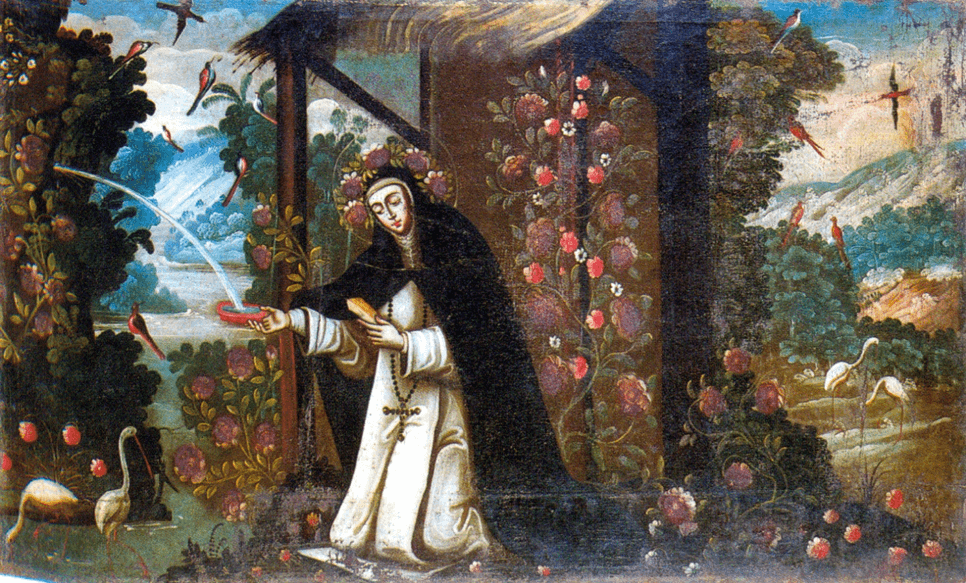The season of summer is often seen as the best of the four seasons for people of the Northern hemisphere. This time of the year also coincides with one of the greatest feasts of the Church, notably Pentecost. The Church has tied the two events together through the Pentecost Ember Days, which is ordered towards consecrating the season of summer to God’s protection. Besides the joys of sunshine and pleasant weather, summer is also the season where nature springs up a delightful array of flowers in full bloom. The Church has not failed to offer this beautiful gift of nature to the service of God, for it is the typical custom for most churches to adorn their altars with cut flowers, thus giving vibrance, colour, and life to her sanctuaries. Sacred Scripture makes abundant references to flowers, thus providing a theological basis to their symbolism. Today we will try to reap some spiritual fruit from these considerations.
The wide array of floral blooms that exists in nature have been likened to the many different types of people in the world, and especially the different states of life that God calls us to. Although modern man is accustomed to equality in all things, the Church does not and can never function as a democracy. The Church is hierarchically governed and there is necessarily an inequality between different states of life, just as how a bishop is greater than a priest, and a priest is greater than a layperson. With a more exalted state of life, comes not only its privileges, but also its duties and its consequences if those duties are not fulfilled. In the Kingdom of Heaven, there also exists a gradation in the degree of beatitude amongst the saints depending on the measure of charity in their souls, as the Angelic Doctor teaches. The Blessed Virgin reigns over the angels and saints as the Queen of Heaven, followed by St. Joseph, and then the apostles, martyrs, confessors, and virgins. St. Thérèse of the Child Jesus sums it up beautifully in the following quote:
He showed me the book of nature, and I understood how all the flowers God created are beautiful – how the splendor of the rose and the whiteness of the lily do not take away from the perfume of the violet or the simplicity of the daisy. I understood that if all flowers wanted to be roses, nature would lose her springtime beauty, and the fields would no longer be decked out with little wildflowers.
And so it is in the world of souls, that is, Jesus’ garden. He willed to create great souls comparable to lilies and roses, but he created small ones as well… and these must be content to be daisies or violets destined to give joy to God’s glances, when he looks down at His feet. Perfection consists in doing God’s will… in being what He would have us to be.
St. Francis de Sales teaches:
If one should ask why God made melons larger than strawberries, or lilies larger than violets, why the rosemary is not a rose, or why the pink is not a marigold, why the peacock is more beautiful than a bat, or why the fig is sweet and the lemon acid — one would laugh at his question, and say: poor man, since the beauty of the world requires variety, it is necessary there should be difference and inequality in things, and that the one should not be the other.
That is why some things are little, others big, some bitter, others sweet, the one more, the other less beautiful. Now it is the same in supernatural things. Everyone hath his proper gift from God; one after this manner, and another after that, says the Holy Ghost. It is then an impertinence to search out why St. Paul had not the grace of St. Peter, or St. Peter that of St. Paul; why St. Antony was not St. Athanasius, or St. Athanasius St. Jerome; for one would answer to these inquiries that the church is a garden diapered with innumerable flowers; it is necessary then they should be of various sizes, various colours, various odours, in fine of different perfections. All have their price, their charm and their colour, and all of them in the collection of their differences make up a most grateful perfection of beauty.
Although an inequality exists, we need not be discouraged if we feel little, for God calls each of us to holiness. Holy Writ teaches us: This is good and acceptable in the sight of God our Saviour, who desires all men to be saved and to come to the knowledge of the truth (1 Timothy 2:3-4). It is also written: this is the will of God, your sanctification (1 Thessalonians 4:3). We can take consolation that St. Thérèse also felt little, but through her resignation to the will of God, she reached great heights of sanctity that even many bishops and priests through the centuries did not achieve. During her time, St. Thérèse may have been considered insignificant compared to a renowned theologian teaching at a great university, however it is St. Thérèse would go down in history to be considered one of the greatest saints of the Church. We must be content to be esteemed as “little flowers” just as Thérèse of Lisieux saw herself, and God, in His providence, will use us for His greater glory.

Flowers are also symbols of virtue. Lilies are the prime example which symbolizes purity. Other examples include roses which symbolizes charity, sunflowers which symbolizes joy, hyssop which symbolizes mortification, and daisies which symbolizes hope. Just as the cut-flowers which adorn the altars of churches are composed of a variety of different blooms, so too we should strive to adorn our souls with all of the virtues, that we may be a pleasing offering to the Lord. The great Carmelite mystic, St. Teresa of Ávila, teaches that our spiritual lives should not only consist of prayer and contemplation alone, but there should also be a conscious focus on the acquisition of virtue. Since virtues are essentially good habits which arise from the will, the first step to acquiring them lies in uprooting their contrary vices. Vices can be likened to the weeds which chokes and prevents the growth of good crops. Therefore, we should strive to uproot them by prayer and mortification. Acquiring virtue and growing in them also involves a lot of self-denial, since we often need to go against our desires in order to strive for the greater good.
In saying this, it would be very foolish to fall into the perception of thinking that the acquisition of virtue is dependent upon our own efforts, for human nature is weak and we are prone to falling. Our Lord taught us that He is the vine and we, the branches – cut off from Him, we can do nothing (ref. John 15). The final gift that Our Lord bequeathed to us before He ascended into heaven is the Holy Ghost, who is poured forth into every soul regenerated in the waters of baptism, and continues to dwell in such souls so long as they do not lose sanctifying grace by mortal sin.
The reason the Latin Church prescribes green vestments to be worn at Mass after the season of Pentecost is to highlight our need to focus on spiritual growth by allowing the Holy Ghost to work in our souls. The Holy Spirit is the great giver of life to whom is appropriated the work of our sanctification. Thus, it is the Holy Spirit who vivifies our souls and makes us spring up with the flowers of virtues and the fruits of good works. We should never grieve the Holy Ghost by hardening ourselves to His operations, but we should resign ourselves in humility to be perfectly docile to His will. The word “humility” is a derivative of the Latin, humus, which means soil. From the Parable of the Sower, we know that the seed of God’s grace needs to grow in good soil, that is a humble soul, and not a soul hardened by pride. The Church’s prayer, “Emitte Spiritum tuum et creabuntur, et renovabis faciem terrae” (Send forth thy spirit and they shall be created, and thou shalt renew the face of the Earth), is a cry for the Holy Spirit to vivify and renew the garden of our souls, and we should pray this and other prayers to the Holy Ghost often if we are serious about making spiritual progress.
The most excellent means of obtaining the graces of the Holy Ghost is through devotion to Our Blessed Lady. St. Louis de Montfort called her the Spouse of the Holy Spirit, for although Our Lord had no need of an earthly mother in order to be incarnate as man, by an ineffable privilege, He has chosen to take flesh in the womb of the Blessed Virgin through the Holy Spirit. In the words of De Montfort: “the more the Holy Ghost finds Mary, His dear and indissoluble Spouse, in any soul, the more He becomes active and mighty in producing Jesus Christ in that soul, and that soul in Jesus Christ.”
The Church has also given the title “Mystic Rose” to the Blessed Virgin in the Litany of Loreto. If all the saints in heaven can be described as flowers in the garden of Our Lord, Our Lady is the most beautiful and exalted of all the flowers. This Mystic Rose emits a most exquisite fragrance that not only gives joy to the saints in heaven, but also perfumes the souls of all Christians who draw near to this rose of incomparable beauty. To all who take refuge in Mary, she covers them with her mantle, and the same Holy Ghost which overshadowed her at the Annunciation will also overshadow her spiritual children, and will cause many flowers of heavenly graces to spring up in the garden of their souls.
Let these considerations encourage our readers to strive for greater holiness. In these times when so many troubles rage on both outside and inside the Church, let us not be discouraged if we find that our prayers and efforts does not seem to be making a difference in converting souls. Even if we are unable to change others, we are at least able to change ourselves, and therefore, this should move us to strive for greater perfection in the spiritual life. God will surely reward our generosity and use us as His instruments to accomplish His holy will upon the world. Together with the Church, let us cry out to Him: “Emitte Spiritum tuum et creabuntur, et renovabis faciem terrae!”
References:
St. Thomas Aquinas – Summa Theologiae, Supplementum Tertiæ Partis, Q. 93
St. Therese of Lisieux – Story of a Soul, Chapter 1
St. Francis de Sales – Treatise on the Love of God, Chapter VII
St. Teresa of Avila – Interior Castle, Book 7, chapter 4.
St. Louis de Montfort – True Devotion to Mary, Chapter 1.


